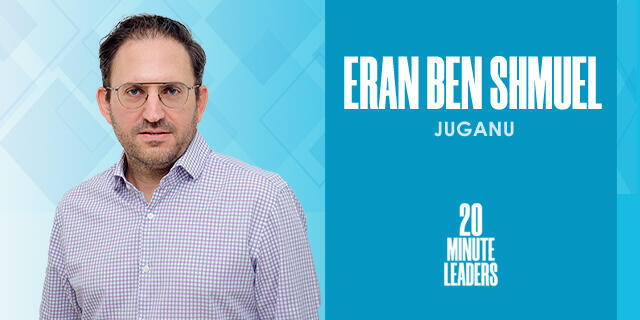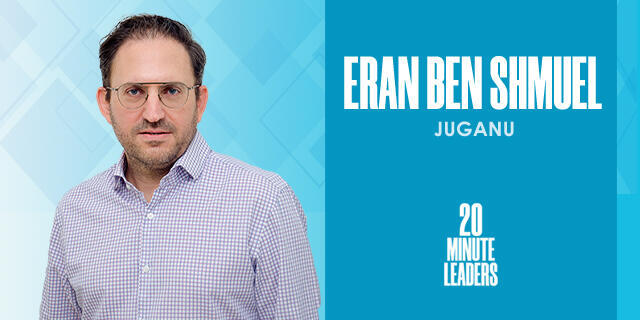
20-Minute Leaders
“I was always amazed by the ability to imagine something and see it in realization.”
Using science to make an impact fairly quickly has always excited Eran Ben-Shmuel, CEO of Juganu.
Using science to make an impact fairly quickly has always excited Eran Ben-Shmuel, CEO of Juganu. Today, he is working to make that impact through Juganu’s platform, which brings digital tools and insights to the offline world while also increasing connectivity. With a complex but simple to install system, customers can gather data about their city or store and make better decisions to manage them. Ben-Shmuel explains that for municipalities, it is important that the leaders and the residents feel good about the system. He says both parties need to see it as helpful and valuable. The company has seen people’s lives change as they feel more comfortable being out in their neighborhood in the evenings, and Ben-Shmuel envisions later being able to warn drivers about hazards such as kids running into the road. He shares that he is amazed to see what he imagines being realized to make an impact.
I'm excited to talk about science, technology, and AI toward a greater vision for a greater future where our cities and our retail are connected. You're a scientist by background, yet also entrepreneurial. What guides you in the way that you think through research or science that excites you?
I'm always attracted to the science that can lead to results that we can see and feel and you really see the impact in the short term more or less. I've always been amazed by the ability to imagine something and see it in realization. I think that technology can be very meaningful to our lives. I was dealing with such a variety of technology that every day my life is very exciting.
Paint me a picture of the world today. We see beautiful weather and beautiful streets, yet you perceive something meaningful that is missing. What is that?
I think that the contrast between the world that we are living in that is online—you have such strong tools in the online. While in the offline, usually, you don't have it. What really intrigued me is to have some real impact on us as shoppers, as people that live in a city. You are going to a supermarket and you buy exactly like my grandmother bought, so there is no big difference.
I think that to bring the technology to do a real impact, to help starting from the lights and the communication: how you take the data, make it accessible, and put all the tools that amazing people created, a lot of insights, a lot of creative thinking, and bring it to realization and to real insights that can help us? This was the basis of Juganu. Juganu wants to take the offline world and to make it accessible—to bring all the digital tools, to bring insights.
What type of world does that make? How does this unleashing of creativity change the way that we're going to live our life?
I would give an example. In Latin America, in a very big city, we installed our system in a neighborhood where people couldn't go out during the evening and feel comfortable because they don't have real support if they have some problem. After we installed the system, I went there and it was amazing to see how people—because of this transformation that’s connected to light, to communication, to digital tools—started to go in the night. This is one of the biggest things that I experienced that made big changes to the people, how they live. But I think it can be much more than this.
When we envision all the connectivity, we start to see that a lot of technology starts to combine together in order to give us a lot of benefits. If my five year old child is doing a mistake and wants to cross the street, I want to know that there is some alarm for drivers to be careful. We are doing the system like this, and it's connected. It’s not only transferring the data to the car but actually changing the color of the lights in order to alarm. I think this is something that is really crucial that the infrastructure will help us to live better.
Tell me about Juganu as a company now.
In Juganu, we are solving some basic problems that cause a very big barrier for cities and retail to implement digital solutions. One of them is the initial cost. We try to harness the technology to enable sophisticated systems to reduce this initial cost. Then you can enable the spread of this hybrid communication in areas when you don't have a lot of money. Everyone deserves good connectivity. I think that people now expect to have good access. In the pandemic, we saw that if you don't have good connectivity, you are just left out from the ability to be connected.
We created the ability to connect one point to another point to another point. This is how you do hundreds of thousands of points, only by wireless connectivity. We created a very complex, but very simple to install, system that just delivers the data between one to the other in a very efficient way. It will be the baseline for deployment of big installations and creating a platform. You can implement multiple sensors. It can be connected to the existing sensors and bring a lot of data to one place. Now, you create this sophisticated system that can enable you to have all the access, all the benefits of the smart city.
I'm conceiving of two blocks: one of them perhaps is a regulatory one where you have to explain it to governments and to municipalities. I'm also curious to hear about the operational process of doing it. How do those two things play out?
It's a process. When we speak about cities, it is with the right attitude to understand that both parties need to feel comfortable and good. It's the city and the citizens. They need to feel that this solution comes to help and brings value to them. We are doing pilots. We are doing installations. We are working with different companies, different cities worldwide. Sometimes we are working with governments or municipalities. Sometimes with companies that have the will and the need to do this transformation.
I think that slowly it's become something that people feel that they need. If you do it in a responsible way, you understand that you own no data: it's not yours, it's a municipality’s, it's the people’s. You do your best in order to give them the tools to manage their data and their infrastructure. You give them the tools, and they are using it for their benefit to bring a lot of value on insights so they can better manage their city or manage their stores better.
There is the software side and the hardware side at this company. It sounds difficult to be able to do both very well. Was that a necessary condition for this company to thrive? Were there different considerations there?
In the end, if you want exposure and ability to take data and to analyze, you need to be there. You need to install something. This is the hardware side. We work very hard so it will be easy to implement. In the software side, it has to be something that is connected between software and hardware. You need to do very sophisticated software in order to support it so you get really good data and you get good analysis and you get the right background and infrastructure in order to run all the tools that you need.
Do you see them as competing for resources within the company or is it two verticals that don't necessarily compete?
I see them as very complementary because we are doing a platform. Our goal all the time was to do a platform that can be used by third parties as well as Juganu. We try to make this data accessible. Then, amazing people come with great ideas, use the data, and then give amazing insights.
Many times a very good algorithm can reduce the needs of the hardware. You need to really use a lot of effort so the hardware side will be as simple and as cost effective as possible. We don't want the cost of the hardware to be the barrier to implement. But to have it in a very optimized way so you don't have a lot of different and fragmented solutions, but you have one holistic platform that's bringing everything.
Michael Matias, Forbes 30 Under 30, is the author of Age is Only an Int: Lessons I Learned as a Young Entrepreneur. He studies Artificial Intelligence at Stanford University, is a Venture Partner at J-Ventures and was an engineer at Hippo Insurance. Matias previously served as an officer in the 8200 unit. 20MinuteLeaders is a tech entrepreneurship interview series featuring one-on-one interviews with fascinating founders, innovators and thought leaders sharing their journeys and experiences.
Contributing editors: Michael Matias, Megan Ryan















